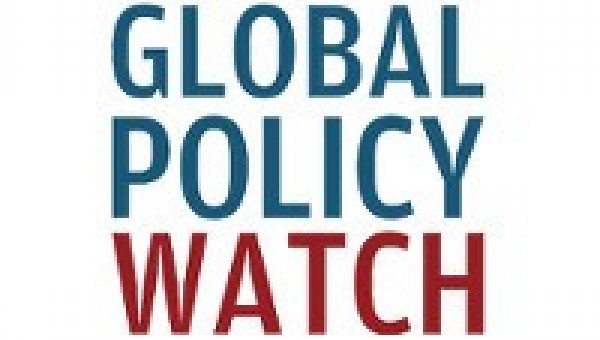News

By Barbara Adams and Roberto Bissio
There is widespread speculation that if/when US President Trump addresses the UN General Assembly on 22 September — probably the only head of state to do so in person– he may warn of major cuts in financial contributions or even threaten to pull out of the UN.
Since he took office in January 2017, the USA has de-funded, withdrawn from, or denigrated several UN agencies and affiliated institutions.
The New York Times reported on 4 September the possible US withdrawal from NATO, if Trump wins a second term as president in November elections. Could the UN be next on the list?
A letter circulating from CSOs notes that if this threat materializes, and since the US pays 22 percent of the UN’s regular budget, it will be a devastating blow to the world body as it commemorates its 75th anniversary.
But how disastrous would this be? However, could such a move trigger a “be careful what you wish for” reaction domestically and among Member States whose multilateralism rhetoric is often not matched by their actions?
Could this be the shock needed to demand genuinely democratic global governance and begin the long overdue transition away from what the UN system has become: a deal-making forum with people and countries represented by the executive branch that does not reflect their diversity and values?
Most expressions of concern address fears for the immediate consequences for the UN budget. Are they ignoring the accompanying leverage exercised in the decision-making process?
In 1985 Prime Minister of Sweden Olaf Palme proposed a ceiling of 10 percent on the assessed contribution of any Member State. In addressing the UNGA to commemorate its 40th anniversary he said: “a more even distribution of assessed contributions would better reflect the fact that this Organization is the instrument of all nations”. While this garnered some support, it exposed resistance in many US circles aware that it would reduce US political power and leverage at the UN.
As US Ambassador Stephanie Power stated clearly in April 2014:
“Our ability to exercise leadership in the UN—to protect our core national security interests—is directly tied to meeting our financial obligations.”
UN decision-making is often compared {favourably} to the weighted voting setup of the IMF and World Bank, having a one country, one vote system as opposed to something closer to one dollar, one vote. This misses the point: there is weighted voting exercised through senior appointments, budgets, threats and self-censorship, and the USA is not the only beneficiary.
In a separate, but not dissimilar situation, the USA managed to get its candidate elected to the presidency of the Inter-American Development Bank (IADB) during a virtual meeting of its Board of Governors on 12 September. Since its creation, the head of the bank has been from the Latin America and Caribbean region.
Mexico, Chile, Argentina and the European Union requested to wait until after the US elections in November before appointing the leadership of the largest financial institution for Latin American and the Caribbean.
Last June US President Trump in a move qualified as “surprising if not stunning” by the specialized press, launched the candidacy of his top Latin American adviser, the Cuban-American lawyer Mauricio Claver-Carone to the IADB presidency. Known for his vocal opposition to the governments of Cuba, Venezuela and Nicaragua, Claver-Carone is the main author of the “América Crece” (America Grows) initiative, launched last December to promote private investment in infrastructure and thus compete with the growing Chinese presence in the region.
Several Latin American leaders — including former presidents Ernesto Zedillo of Mexico, Ricardo Lagos of Chile and Julio Maria Sanguinetti of Uruguay — have signed a public letter opposing Claver-Carone, not just as a breach of the “gentlemen’s agreement” committed to by then President Dwight Eisenhower and EU foreign policy chief Josep Borrell, in a letter quoted by Reuters cited the coronavirus pandemic and the “hawkish” policies of Claver-Carone as reasons to postpone the election.
Nevertheless, with the support of presidents Jair Bolsonaro of Brazil, Iván Duque of Colombia and other smaller countries, the Trump candidate was estimated to have gathered the commitments of 54 percent of the votes.
The IADB lends some US$ 18 billion a year to Latin American and Caribbean countries, while the China Development Bank (CBD) and the Import-Export Bank of China (China Exim) lend together some US$ 2 billion a year. However, most of Chinese investment in the region is in the form of direct investment or private-public partnerships (PPPs), amounting to some US$ 12 billion a year in pre-COVID-19 times. “América Crece” would directly compete in that area, presumably with IADB guarantees for American corporations investments in infrastructure.
In order to be elected, the US candidate needed not only an absolute majority, but also a quorum of at least 75 percent of the voting power. This is a rule introduced by the USA, which holds 30.006 percent of the votes, giving it the possibility of vetoing any resolution by simply walking out. The Argentinian government tried to mobilize the opposition to Claver-Carone to play the walkout card and thus force a postponement of the vote until after the US elections.
The votes of Argentina (11.3%), Mexico (7.3%) and the 13 EU members of IADB (holding together 9.2 percent of the vote) could have ensured the success of this strategy. But the proposed walkout, while perfectly legal under IADB rules, was qualified as “obstruction” by the White House. At the end of the day all countries attended, and by staying in the room to vote against Claver-Carone those that were against ensured the quorum needed for his election. The verbal championing of multilateralism did not translate into action.
(This blog post was updated on September 13 to reflect the outcome of the IADB elections).
